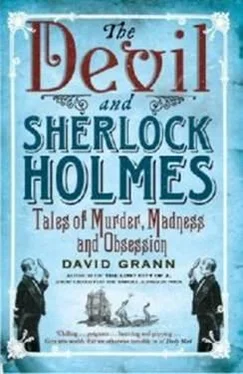That day was the coming-out for Constant and his Front for the Advancement and Progress of Haiti, better known as FRAPH, which in Creole evokes the word “frapper,” meaning “to hit.” (Constant said the name had come to him in a dream.) Organized by Constant several months earlier, FRAPH was described by its leader as a grass-roots political organization-“a mysterious event”-that would rise from the masses and replace the remnants of Aristide’s populist movement. The party literature, which Constant composed on an old manual typewriter and handed out to the press, explained that “FRAPH is a popular movement of unity, where all the social sectors are firmly intertwined to bring perfect harmony.”
But FRAPH was a peculiar sort of political party: although it offered free food and liquor to lure supporters, most of its thousands of followers were drawn from the armed bands that operated at the military’s behest and from former members of the now defunct Tonton Macoutes, the infamous paramilitary organization named for a child-snatching bogeyman in Haitian fairy tales. At rallies, FRAPH members would slam their right fist into their left palm in mass salutes. And although FRAPH’S literature spoke of unity, Constant declared publicly, “If Aristide were to return, he would die. Aristide and his supporters are the enemies of this country.”
Despite such warnings, Constant tried to cultivate an image as the only gentleman in a band of thugs. At the official launching of FRAPH, as his men flanked him with guns, he released a handful of doves. Rather than don a soft hat and sunglasses, or camouflage pants, like other paramilitaries, he often appeared in a sharp blue suit and tie and carried a bamboo cane, which he leaned on as he walked. He had been raised within Haiti’s tiny aristocracy, and had studied at Canadian universities and worked briefly in New York as a Haitian diplomat. He spoke English with only a slight accent, and translated for the press in Spanish and French. “Never forget that I am from the establishment,” he liked to say. “I am not just any Joe out there. I’m Constant.”
Still, there was something frightening about him. His eyes, set deep in his head, were glassy and jittery. U.S. officials and reporters said that he was wired on cocaine (Constant has always denied this), and he was known to stay up all night, driving wildly through the streets, his bodyguards hanging out the back of the car with their machine guns. In public, he usually appeared with a man named Jojo, a fierce former Macoute who claimed that his pregnant wife had been murdered by Aristide’s supporters and who was regarded as a merciless killer. “He is not afraid of anything,” Constant still says of Jojo respectfully.
With Jojo as his partner, Constant began to set up FRAPH offices in every town and village. Members received special I.D. cards and machine guns. Like the old Macoutes, they operated as part local bosses, part spies, part extortionists, part militia, and part political cadre. But at their core they were an extension of the military’s might, a brutal “force multiplier,” as one U.S. intelligence report put it, which would allow the regime the deniability that a prudent government always looks for in the use of murder. “FRAPH’S will is an order,” Constant declared shortly after the storming of the port. “When we ask for something, the entire country has to accept it.”
More and more packs of armed men began to roam at night, looking for Aristide supporters. They were believed to be FRAPH, the police, or the military, or a combination of the three, but they were usually careful to disguise themselves with hoods or women’s clothing (a trademark of the old Macoutes). They carried tire irons, M16s, Uzis, pistols, machetes, axes, and “voodoo powders,” which were widely believed to be lethal. They broke into homes and seized their political enemies. “I realized that I was among animals,” an Aristide supporter who was taken prisoner by one of these armed packs told human-rights monitors. “At first they played with me, taking out their guns and saying I would die. Then they took me to a little torture chamber where there was a small bed… They started beating me about the buttocks with their truncheons, one after the other. At that moment, I thought I would die. I passed out. When I came to, I was in a cell with another man. There were rivers of blood on the floor. Some of it was mine.”
In 1994, after an extensive investigation, the O.A.S./U.N. International Civilian Mission reported, “The scenario is always substantially the same. Armed men, often military or FRAPH members, burst into the house of a political activist they [sought] to capture.” If he wasn’t there, the intruders attacked his wife or sister or daughter. “One guy took me by the hands and led me to the front porch,” a woman told Human Rights Watch. “He said lie down. He said, ‘If you don’t, I’ll split your head open.’… He pulled his pants down to his knees, lifted up my nightgown, pulled down my underpants, and raped me.”
Faceless bodies began to appear in the streets. The assailants had developed a kind of art known as “facial scalping,” a bloody ritual in which a person’s face was peeled from ear to ear with a machete. It was a way to torture people even in the afterlife, because, many believed, such mutilation would prevent a proper burial-trapping the spirit eternally in purgatory.
As the bodies piled up, Constant held forth. He would often sit in a rattan chair in the courtyard of the house that had been his father’s, a sprawling Art Deco mansion with a swimming pool and fountains, and speak to the press. Unlike other paramilitary leaders, who purposely remained in the shadows, Constant craved attention. He let reporters sleep in his garden. He cut back the hedges to make more space for them and handed out T-shirts emblazoned with FRAPH’S name. “At one point, I was the most interviewed person in the world,” he recalls. “It was incredible.” Constant enjoyed playing the role of statesman. He warned the United States not to intervene and threatened to shut down the country in protest of the world embargo put into place after the coup. He called for the dissolution of Haiti’s parliament, echoing Jojo, who had earlier warned that, if it didn’t disband, FRAPH would call on the people to “tie up the deputies.” As Constant put it, “A leader has to know how to play with the army, the power, and the people.”
As he cultivated the press, Constant also courted Haiti’s houngans, or voodoo priests, a potent psychological force. He portrayed himself as an embodiment of the most ferocious spirits. He held public ceremonies in front of the markets or at temples, where his men laid out small skulls. At a typical ceremony, he would lie on the ground, surrounded by skulls and fire. Then, as he rose from the flames, the crowd would chant in Creole, “Toto for President! Without Toto, Haiti can’t have a life.” Though he still carried a.357 Magnum, he insisted that he no longer needed it. “I have the power of voodoo with me,” he said.
In Haiti, nearly every leader has a hidden history, a family closet usually filled with the bones of enemies. Constant inherited the secrets, and to some degree the power, of his father. Gerard Emmanuel Constant had been the Army chief of staff under Haiti’s dictator François “Papa Doc” Duvalier during the nineteen-sixties. A loyal soldier, he once famously rose from his bed in the middle of the night to execute, along with other officers, more than a dozen of his friends at the dictator’s command. He remained a symbol of the old ruling order after it had collapsed.
But shortly after the military coup, in September of 1991, as his disciples emerged from the barracks to restore the Duvalier system, the seventy-two-year-old general slipped into a coma and died. All the military leaders and former Duvalier supporters turned out for his funeral. “It was a real phenomenon,” Constant says. “I was inheriting all my father’s protection and power and people. It was a symbolic transference.” In his private papers, Constant went further: “My prominence, some might argue, is destiny… To be the first son of General Gerard Emmanuel Constant is the call to arms for Emmanuel Gerard Constant, myself.”
Читать дальше











